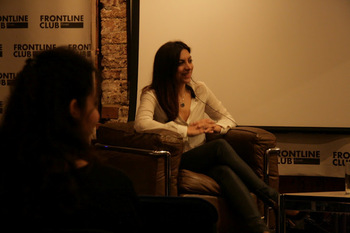
Popularly known as the Paris of the Middle East, Lebanon is said to be culturally liberal compared to most Arab countries in the Middle East. However, such is not the belief of Joumana Haddad, a Lebanese journalist and poet based in Beirut. She says, "I feel liberated but I wear a veil."
The documentary "Jasad", meaning "body", is titled after a controversial magazine, founded by Haddad in 2008. The magazine tackles several issues faced by Arab women such as hymenoplasty, homosexuality, eroticism, feminism, sexual health and virginity, usually considered taboo topics and culturally sensitive.
Captivated by the idea while browsing through the quarterly magazine director Amanda Homsi-Ottoson said, "This film was very personal to me. I still remember how I walked into a library one day and saw this magazine and was then very keen to find the woman behind it."
Having questioned several cultural beliefs growing up in a conservative society, she said, "While I was growing up in Lebanon, this was something I struggled with on a daily basis. Talking to my friends about issues on virginity and sexuality was unthinkable."
"I still look back at some of my early days in my late teens and early twenties and wondered if a lot of people were going through this, I wanted to explore how people felt about this today."
Members of the audience raised several questions on content and were surprised by the wide spread condemnation from the feminists present in the film.
One said, "I thought the feminist group's views were contradictory to the ideas of Joumana which was quite surprising. I was shocked when some of the women didn't agree with what Joumana does. There are more naked women on posters in Beirut. Are women meant to be seen as products? "
Another said, "There is a fine line between artistic and pornographic, will she be disillusioned if people are looking at the pictures and not bother to read the text"
"They may see it as pornography but there are so many beautiful stories. Jasad is trying to help women reconcile with their bodies, “said Ottoson
"Content is about freedom of choice, you have to provoke people to wake them up and make them think about things, people are still stuck in their old ideas and that’s what Joumana is trying to do through her magazine."
It wasn't long before the aspect of distribution came up. Many thought it was quite surprising distribution of the magazine was not halted by the government in Lebanon, especially after the film 'Beirut hotel' was banned in Lebanon last year, for similar reasons.
In its fifth year now, despite several controversies the magazine has a large number of subscribers from Saudi Arabia, Jordan, Syria and Dubai. Haddad cleverly seems to have won the approval of the Ministry of Information and the Journalists Syndicate in Lebanon.
"Allowed by the ministry of information, she said she felt quite fortunate. To her luck, also recently the minister had changed, previously it was someone who was much stricter."
"Lebanon is undergoing a lot of change politically. With the Arab spring and revolution in most gulf countries, one may never know about the future," said Ottoson.